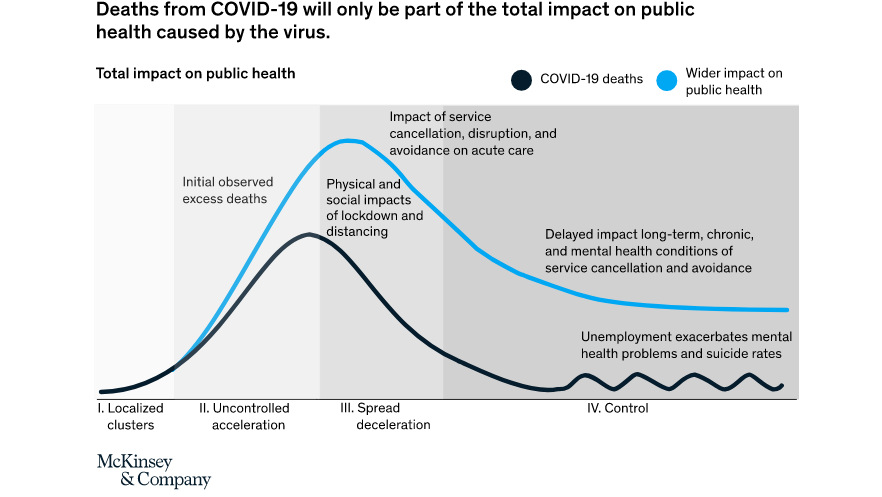What Europe proposes to improve the resilience of health systems after the pandemic? (I)
Health is a transversal element in European policies, and with a program bolstered with €5.1 billion over seven years, Europe is looking to tackle the challenges that the pandemic has magnified: prevention, preparation, digitalization and strengthening healthcare systems and their human resources. This post looks at the EU’s ambitious response seeking to make healthcare systems more resilient.

The vision for a “Health Union” isn’t new in the collective imagination of the European Union. EU4Health is the fourth health program since 2003. The impact assessment on the previous programs (1 to 3) carried out in 2018 made it clear that the main focus must remain on improving public health, preventing and managing diseases, mitigating risks to human health, including across borders, and harmonizing legislation to improve people’s health, reduce inequalities, boost innovation and increase the systems’ (economic) sustainability. There are two significant changes in the 2021-2027 program, born during the pandemic. The concept of “Human Health” is closely tied with that of “One Health” (first used in the early 2000s) and environmental sustainability plays a bigger role.
One Health, health for all things big and small
It’s not just about human health anymore. Health is for all sectors, and the programs, policies, legislation and research to implement in each sector must communicate with and mutually reinforce each other. Clearly inherited from the COVID era. The “One Health” policies promoted by the WHO and embraced by the EU connect public health with food safety, zoonotic disease control and antibiotic resistance. Before too, but more so now.
Image: IsGlobal
The framework under which EU4Health is being promoted: the pandemic
Expansion and contraction
COVID triggered an unprecedented mobilization of the scientific community, and opened up research like never before. For example, from January to October 2020, there were more publications on COVID-19 than on diabetes and dementia combined, and the rate of open-access COVID articles was 76%, compared to 44% and 40% for the other two areas. This knowledge fueled innovative potential to unparalleled heights. When Europe published the EU4Health program, there were 24 countries with more than 2 SARS-CoV-2 vaccine studies registered, and 23 with over 15 drug trials underway (by the way, Spain’s position is noteworthy and Catalonia accounts for 50%).
Source: OCDE
But the healthcare crisis in Europe had a dark side: beyond infections or deaths caused by COVID directly, the pandemic had a bigger indirect impact that wasn’t being managed: the excess deaths during the pandemic, the physical and mental effects of isolation, the effects of canceling services and limiting care for other diseases, the impact of limiting care for chronic conditions and mental health issues, the problems stemming from lost jobs and disruptions to the economy... We all know the story.
Source: McKinsey
Let’s talk about resilience
That’s why the term resilience has become a fixture in our vocabulary since March 2020. What determines the resilience of healthcare system? Haldane et al. propose a scheme based on the five WHO building blocks, centered around community engagement. A resilient healthcare system aims to serve the community according to their needs in a more inclusive, equitable manner, promoting healthy societies.
And this is the idea behind EU4Health, Europe’s fourth, updated health program.
Program basics and related policies
Three key ideas related to EU4HEALTH:
- It isn’t R&D in the healthcare and life sciences
- It is R&D in public health policies
- It is also the EU’s response to the need to prepare the Union against COVID (currently) and future pandemics.
Managed by HaDEA (the agency in charge of health, food safety, digital technology and networks, industrial capacities and space), the program offers grants, awards and funds for public procurement, prioritizing the aspects in the box below.
EU4HEALTH priorities
|
After identifying the barriers to preparing healthcare systems to tackle new challenges, and to prevent disruptions while still looking forward, Europe’s proposal is highly valuable. In spite of any defects it may have, the spirit of EU4HEALTH is in the right line.
Improving health data, promoting digital services adoption, boosting system transformation, promoting implementation of good practices and data sharing, improving access to a patent-centric, results-based healthcare system with clear support for the Europe-wide integration of healthcare systems.





